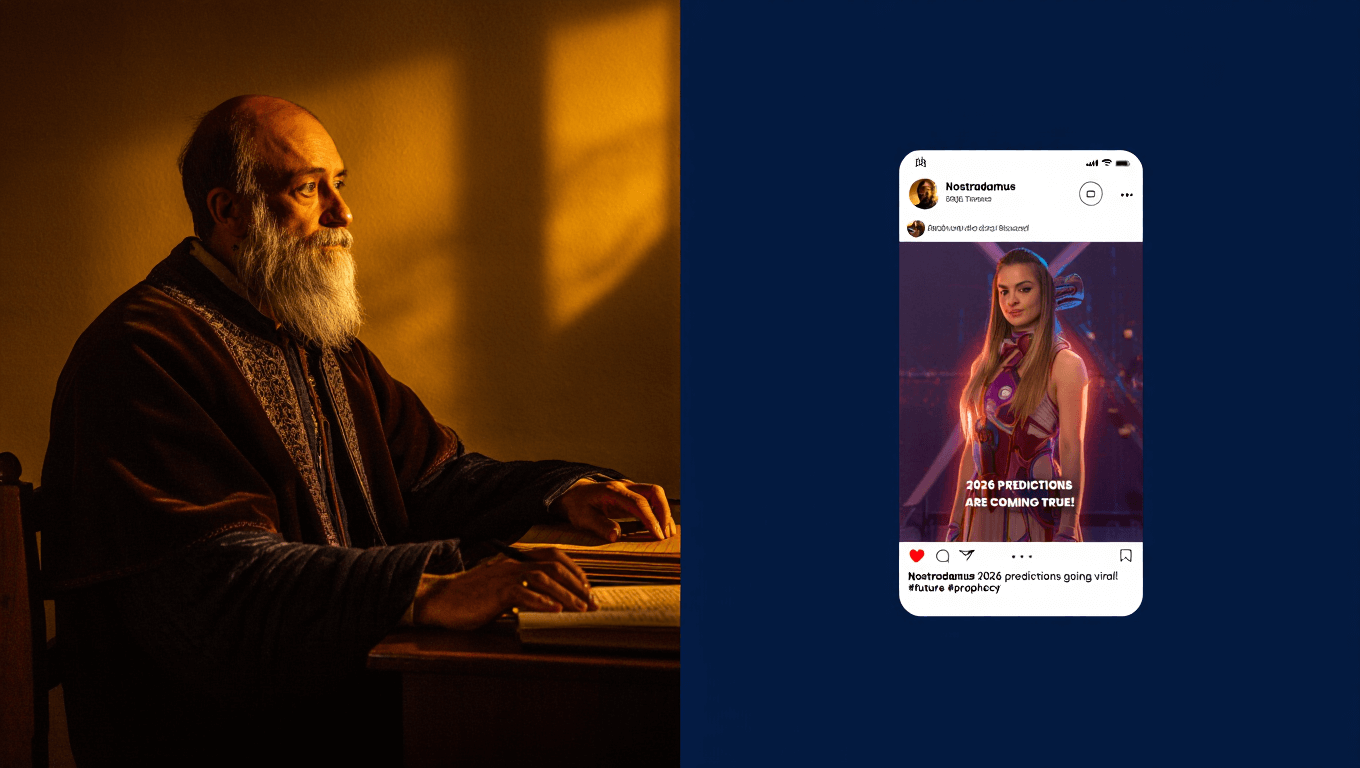Nostradamus 2026 predictions are taking over social media in October 2025. The 16th-century French astrologer’s prophecies sparked viral theories about World War III and AI takeover. Millions of people are dissecting his cryptic quatrains online. Entertainment outlets report the trend is dominating TikTok, Twitter, and YouTube as conspiracy culture peaks.
TubiTV Just Hit 200 Million Users – Here’s Why
10 Perfect-Score Shows Buried on Prime Video Right Now
🔥 Quick Facts:
- Nostradamus lived from 1503 to 1566 and made 946 prophecies total.
- Only about 70 predictions are considered to have partial fulfillment by believers.
- 2026 doomsday theories cite World War III and AI dominance as primary concerns.
- Viral content mentions a “cosmic fireball” and global conflict scenarios.
- Experts warn these predictions are vague and subject to heavy reinterpretation.
What These Viral Predictions Actually Say
Modern interpreters claim Nostradamus predicted major catastrophe for 2026. Believers say his quatrains reference World War III breaking out between global superpowers. They cite tensions in multiple regions as evidence the prophecy is materializing now. The predictions also allegedly warn of advanced AI systems becoming uncontrollable.
The $3.99 Streaming Service With 500+ Oscar Winners Nobody Knows About
Cancel These 3 Subscriptions Before November 1st – Here’s Why
The “Living Nostradamus,” a modern psychic named Athos Salomé, has amplified these theories significantly. According to New York Post, Salomé claims personal hits like predicting Elon Musk’s Twitter acquisition. He warns that AI will reach a point of no return in 2025-2026. His predictions directly fuel current viral trends.
“AI systems will become powerful enough to mimic human reasoning and operate in multiple domains simultaneously. We’re losing control as more power transfers to machines.”
Why These Theories Go Completely Viral
TikTok and Twitter users are obsessed with Nostradamus 2026 theories right now. The content combines entertainment with genuine anxiety about real-world threats. AI development is advancing rapidly, making doomsday narratives feel more plausible. Geopolitical tensions are high globally, adding credibility to war predictions.
Internet culture loves mysterious prophecies because they’re endlessly interpretable. One person reads “cosmic fireball” as nuclear war. Another sees a meteor strike. This ambiguity keeps people engaged endlessly. Entertainment value drives sharing, which amplifies reach exponentially.
Celebrity culture intersects with conspiracy culture here too. Instagram, YouTube, and streaming platforms feature constant Nostradamus content creation. Young audiences particularly engage with these mystical narratives. The blur between entertainment and actual belief becomes completely blurred online.
The Historical Facts and Major Skepticism
Historians and scientists overwhelmingly reject Nostradamus predictions as genuine foresight. History.com, Britannica, and academic researchers prove a simple uncomfortable truth. Nobody has ever predicted a specific future event using his writings beforehand.
| Prediction Aspect | The Reality |
| Total Predictions Attributed | 946 quatrains (many attributed incorrectly) |
| Actually Fulfilled (Claimed) | Only 70 total, very loosely interpreted |
| Scientific Validation | Zero – completely rejected by science |
| Accuracy Rate | No better than random chance guessing |
| Prediction Method | Astrology mixed with historical pattern repetition |
Critics point to a major logical flaw in Nostradamus analysis. His quatrains contain zero specific dates, names, or verifiable details. Believers apply his vague metaphors retroactively to events already happened. This is called retrofitting in academic circles.
The technique works like this: after an event occurs, believers find a quatrain that sort of matches if interpreted creatively enough. Before the event? Nobody uses his predictions successfully. This one-directional pattern proves they’re not actually predictive.
What Entertainment Media Gets Right and Wrong
Entertainment outlets report Nostradamus trends accurately but lack proper skepticism sometimes. LADbible, Tyla, and Daily Mail publish these stories as engaging pop culture content. That’s fair—they’re not science publications claiming validity.
The problem emerges when entertainment framing gets mistaken for journalism. Casual readers don’t distinguish between entertainment speculation and factual analysis. Stories go viral partly because they’re presented as mysterious rather than clearly debunked.
TikTok creators generate millions of views discussing these prophecies. They rarely mention that historians categorically reject them as real prediction. This creates information gaps where entertainment replaces education online.
Are These 2026 Theories Actually Dangerous?
Psychological research shows that persistent doomsday narratives can cause real anxiety. Young people especially internalize apocalyptic content consuming it constantly. BBC and Academic studies found that massive conspiracy exposure increases stress levels.
The theories aren’t inherently dangerous but become problematic at scale. When billions of people share similar doomsday content, collective anxiety spikes measurably. Mental health professionals now track this “apocalyptic anxiety trend” phenomena.
Entertainment culture intersects dangerously here. Movies, streaming shows, and social media simultaneously promote both doomsday scenarios and escapist fantasy. The line between entertainment and mental health concern blurs significantly.
What Actually Happens After 2026 Predictions Fail?
Historically, when major Nostradamus predictions don’t occur, believers shift dates forward slightly. If World War III doesn’t happen in 2026, interpretations suddenly become “2027,” “2028,” or “gradual process beginning 2026.”
This moving target strategy keeps prophecy believers engaged indefinitely. Failed predictions never actually kill belief because interpretation flexibility is unlimited. Psychological research calls this “cognitive dissonance management.”
Entertainment content will absolutely pivot. Streamers, content creators, and media outlets will produce videos like “Why 2026 Didn’t Happen But 2027 Will.” The cycle continues forward profitably. Viral content never really dies—it just adapts and rebounds.
Should You Actually Be Concerned About These Theories?
Real-world risks like climate change, geopolitical conflict, and AI ethics deserve serious attention. Nostradamus prophecies distract from addressing genuine problems requiring action. Entertainment narratives become obstacles to productive worry allocation.
Enjoy conspiracy theories as entertainment if desired. Understanding they’re fiction rather than prediction keeps your perspective healthy. Critical thinking skills matter more than ever in October 2025 internet culture.
Watch the YouTube documentary analysis here to understand how prophecy interpretation actually works:
Sources
- History Channel – Comprehensive Nostradamus fact-checking and biographical information
- New York Post – Living Nostradamus predictions and social media viral trends coverage
- BBC and National Geographic – Historical context and modern internet culture analysis
Similar posts:
- Nostradamus sparks 2026 doomsday frenzy as AI, war prophecies go viral on TikTok
- Nostradamus 2026 predictions spark social media frenzy over AI warnings and World War III theories
- Nostradamus predictions 2026 spark viral debate as war, AI takeover prophecies resurface
- Nostradamus sparks viral fears with 2025 end-of-year predictions, 3I/ATLAS cosmic event linked
- Nostradamus predictions 2026 warn of World War III and AI takeover

Daniel Harris is a specialist journalist focused on the crossroads of breaking news, extraordinary history, and enduring legends. With a background in historical research and storytelling, he blends timely reporting with timeless narratives, making complex events and ancient myths resonate with today’s readers. Daniel’s work often uncovers surprising links between present-day headlines and legendary tales, offering unique perspectives that captivate diverse audiences. Beyond reporting, he is passionate about preserving oral traditions and exploring how extraordinary stories continue to shape culture and identity.


Ever heard the one about Nostradamus predicting World War III and AI takeover in 2026? Some say its just fear-mongering, while others are stocking up on canned goods. Whats your take on these viral theories? Time to invest in a bunker or just grab some popcorn?
Remember that time we all thought the world would end in 2012? Now its 2026, and were back at it with Nostradamus predicting World War III and AI takeover. Whos stocking up on canned goods this time? #HistoryRepeats?
Ever hear those Nostradamus 2026 predictions? Theyre like a modern-day crystal ball. World War III and AI takeover? Sounds like a sci-fi flick. Are we just feeding off fear, or is there something more to these theories? Whats your take on all this viral buzz?
Ever wonder what Nostradamus might say about 2026? Predictions of World War III and AI takeover are spreading like wildfire. Do you believe these theories, or are they just fueling unnecessary panic? Whats your take on the latest doomsday prophecies?
Nostradamus and his cryptic prophecies, huh? People love to stir up a good ol panic stew with a pinch of world-ending spice. Its like were all waiting for a blockbuster movie to unfold in real life. But lets face it, these doomsday theories come and go faster than a TikTok trend. Remember Y2K? Yeah, thought so. So, are we stockpiling canned goods and building underground bunkers, or are we keeping it cool and enjoying the show from the sidelines? Whats your bet on the next big prophecy to hit the headlines?
Remember that wild Nostradamus dude? Now predictions swirl about World War III and AI ruling the world. Anyone else getting major doomsday vibes, or are we just in for another round of Y2K panic?
Ever heard the one about Nostradamus predicting World War III and an AI takeover in 2026? Some think its all just hype, while others are stocking up on survival gear. Whats the wildest theory youve come across lately? Lets spill the tea!
Remember that time we all got obsessed with Nostradamus predictions? Now its 2026, and theories about World War III and AI are blowing up. Are we just addicted to fear or is there some truth to these viral prophecies? Whats your take on it all?
Ever hear the one about Nostradamus predicting World War III and AI taking over in 2026? Some folks really diving deep into those theories. Whos stocking up on canned goods and robot repellent?
Ever heard the tale of Granny Agnes who predicted the Great Fire of London? Nostradamus 2.0 with a 2026 remix, huh? Are these theories really worth the bandwidth theyre hogging? What do you think drives these viral predictions – curiosity or fear?
Remember that time we all thought the world would end in 2012? Now, Nostradamus is back in the spotlight with 2026 predictions. Do you buy into these theories, or is it just another case of viral doomsday hysteria?